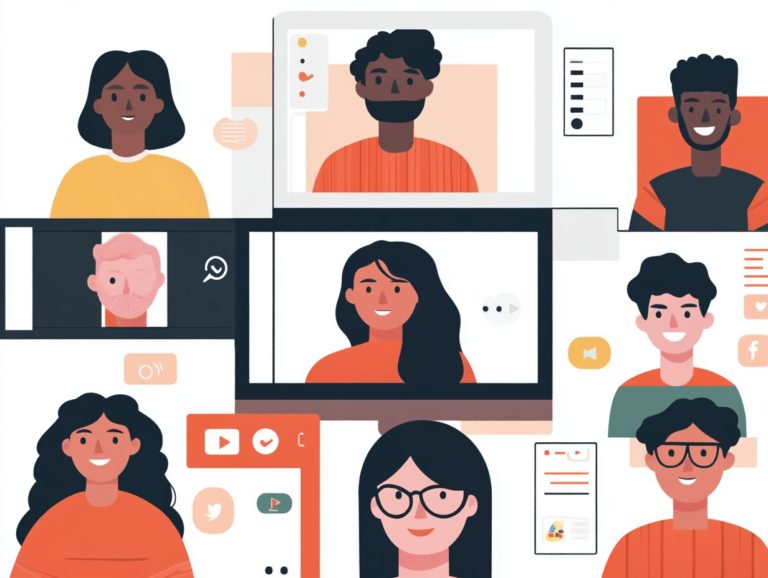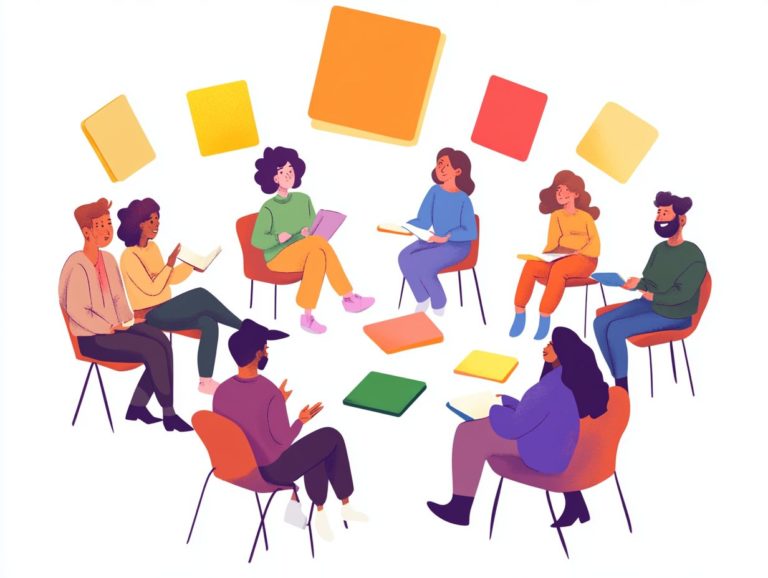5 games to enhance your language skills
Language skills are crucial for effective communication. What better way to refine them than by immersing yourself in the joy of games?
This article explores five captivating games Scrabble, Crossword Puzzles, Boggle, Taboo, and Charades. These games not only entertain but also enhance your vocabulary, spelling, and language proficiency.
Discover how these games target essential language skills and adapt to different proficiency levels. Learn how to integrate them into language learning curriculums for maximum impact.
Contents
- Key Takeaways:
- 1. Scrabble
- 2. Crossword Puzzles
- 3. Boggle
- 4. Taboo
- 5. Charades
- How Do These Games Help Improve Language Skills?
- What Specific Language Skills Do These Games Target?
- How Can These Games Be Adapted for Different Levels of Language Proficiency?
- Are There Any Other Benefits of Playing These Games?
- What Are Some Other Games That Can Help Enhance Language Skills?
- How Can These Games Be Incorporated into Language Learning Curriculums?
- Frequently Asked Questions
- 1. What are the benefits of playing games to enhance language skills?
- 2. Can these games be played by non-native speakers?
- 3. Are these games suitable for all ages?
- 4. Do I need special equipment to play these games?
- 5. Can I play these games alone or do I need a partner/group?
- 6. How often should I play these games to see improvement?
Key Takeaways:

- Scrabble boosts your vocabulary, spelling, and critical thinking.
- Crossword puzzles enhance your knowledge of synonyms and idioms.
- Boggle sharpens your memorization and quick thinking.
1. Scrabble
Scrabble is an exciting classic that transforms your vocabulary skills. It is a powerful tool for education, making it essential for any language classroom.
As you form words on the board, your creativity and strategic thinking are put to the test. The rules encourage critical thinking about word formation and scoring.
While playing, you will naturally expand your vocabulary and learn new terms in a lively atmosphere. Scrabble also promotes peer learning, enabling you to share insights and strategies with others.
2. Crossword Puzzles
Crossword puzzles are engaging word games that challenge you to fill in a grid based on clever clues. They sharpen your vocabulary and make learning fun.
These puzzles stimulate your mind and encourage teamwork. Beginners can start with simpler puzzles while advanced learners can tackle more complex themes.
Themed crosswords can deepen your understanding of literature or science. Incorporating them into lesson plans enriches vocabulary and enhances communication skills.
3. Boggle
Boggle is a fast-paced game where you find as many words as possible from a letter grid. This game is a thrilling way to enhance your vocabulary while enjoying time with friends.
Its simple rules make it easy to learn, and it boosts your quick thinking. Teachers can transform traditional vocabulary lessons into lively experiences.
Boggle encourages friendly competition and collaboration. This creates a positive atmosphere for language learning, making it enjoyable and rewarding.
4. Taboo

The Taboo game invites you to describe a word without relying on certain forbidden terms, helping you tell stories creatively. This interactive experience serves as a delightful educational tool in language learning, fostering peer interaction and honing communication skills.
As you engage with how the game works, you’ll find yourself thinking critically and creatively. This significantly boosts your ability to wield descriptive language with finesse.
The game’s adaptability for varying proficiency levels in an ESL context means that learners of all backgrounds can join in comfortably. For example, educators can choose simpler words for novice players. Meanwhile, they can present complex challenges for advanced learners.
5. Charades
Charades is a vibrant guessing game where you act out words or phrases without uttering a single word, boosting your vocabulary while having fun with your friends. This interactive approach to learning can significantly enhance your language skills and foster collaboration among peers, making it an ideal choice for the language classroom.
When you participate in this game, you express ideas and concepts creatively, using gestures, facial expressions, and movements to convey meaning. Charades can easily be adjusted for different levels of language proficiency, ensuring that whether you’re a beginner or an advanced learner, you ll find it both accessible and stimulating.
As a teacher, you can introduce themed categories that focus on specific vocabulary. This helps students use their non-verbal cues effectively while honing their communication skills.
How Do These Games Help Improve Language Skills?
Games like Scrabble, Crossword Puzzles, and Charades give you fun ways to elevate your language skills, from expanding your vocabulary to honing your descriptive prowess and creative storytelling abilities.
By weaving these interactive methods into your language learning journey, you can enrich your overall English proficiency while enjoying the process. Incorporating 7 ways to make language learning fun can turn your practice into an engaging experience. Each of these games focuses on specific linguistic competencies, providing a dynamic platform for peer learning—an essential ingredient for practical language acquisition.
For example, Scrabble invites you to strategize and expand your vocabulary as you aim to craft high-scoring words. Similarly, crossword puzzles test your spelling and encourage you to retain knowledge through clues that require a touch of critical thinking.
Charades sharpens your descriptive language skills and nudges you to articulate concepts without words, allowing your expressiveness to shine. Research supports that these interactive experiences significantly enhance language retention, making them invaluable tools in any educational setting.
What Specific Language Skills Do These Games Target?
The games you play are designed to improve specific language skills, focusing particularly on vocabulary, descriptive abilities, and creative expression. Incorporating 5 games to enhance your language skills offers a well-rounded path to language learning, essential for effective communication in both spoken and written English.
Take Scrabble, for instance. It enhances your vocabulary by prompting you to think of various words, while sharpening your strategic thinking as you navigate different letter combinations.
Then there’s Taboo, which helps you express ideas without certain keywords. This skill proves invaluable for clear communication in work settings where precise language is key.
Charades takes things up a notch by nurturing your creative storytelling abilities. It encourages you to convey concepts through gestures and expressions, a talent that comes in handy during presentations or storytelling situations.
By weaving these engaging games into your routine, you can refine your language skills while having fun. Check out 5 ways to incorporate games in language learning and start playing with your friends to improve your language skills while having a blast!
How Can These Games Be Adapted for Different Levels of Language Proficiency?

Games can easily be adapted to suit various levels of language proficiency. This means you, whether a beginner or advanced learner, can jump in and enjoy learning!
By tailoring the complexity and rules, educators can effectively integrate these games into the foreign language classroom. Implementing strategies like adjusting the difficulty level, using simpler vocabulary, or incorporating digital technologies allows teachers to create an inclusive environment where everyone feels comfortable participating.
For instance, pairing advanced learners with beginners helps students learn from each other. Digital tools also give you quick feedback and diverse resources that cater to your unique learning style.
It’s vital to make these games accessible to everyone. When everyone participates, learning becomes more exciting! Such thoughtful changes help you get fully involved, transforming the language learning experience into something both enjoyable and effective.
Are There Any Other Benefits of Playing These Games?
Playing language games offers you a wealth of benefits that extend far beyond just improving your language skills. These advantages significantly contribute to your overall experience in the language classroom.
By integrating collaborative games, you can elevate your communication skills while forging strong bonds with your classmates. When you work together in teams to tackle language puzzles, you’re not just practicing vocabulary; you’re also honing your teamwork and problem-solving abilities.
The competitive edge of games fuels your motivation, pushing you to improve and showcase your skills. As you celebrate small victories together, a sense of camaraderie develops, creating a supportive environment where you feel comfortable taking risks.
This enriched social dynamic is key to keeping you excited and engaged, leading to more effective language acquisition and lasting relationships with your peers.
What Are Some Other Games That Can Help Enhance Language Skills?
In addition to classics like Scrabble, Taboo, and Charades, you can explore a variety of other games that elevate your language skills, such as:
- Pictionary
- Bingo
- Flashcards
These engaging tools play a significant role in the interactive language learning process, opening up new avenues for creative storytelling and vocabulary enhancement.
Games like Pictionary push you to think critically and visualize concepts, which sharpens both your comprehension and expression. Bingo can be customized to focus on specific vocabulary sets, transforming lessons into engaging experiences while reinforcing retention through repetition.
Meanwhile, Flashcards also provide a flexible way for quick review sessions, enabling you to tackle new words in an interactive format.
By incorporating a range of games into your language lessons, you not only keep the enthusiasm alive but also cater to diverse learning styles, ensuring that everyone can flourish in a vibrant educational environment.
How Can These Games Be Incorporated into Language Learning Curriculums?
Incorporating games like Scrabble, Charades, and Taboo can truly enhance language learning. They make education more dynamic and increase student interest.
Integrating these games into lesson plans fosters an interactive and effective learning experience. Align game objectives with language goals for streamlined teaching.
For instance, Scrabble boosts vocabulary retention while Charades encourages verbal and non-verbal skills. Many schools have successfully shown that these methods increase participation and improve language skills.
Use formative assessments during game sessions to gauge progress. Adjust your strategies to ensure every learner benefits from this engaging approach.
Frequently Asked Questions

1. What are the benefits of playing games to enhance language skills?
Playing games is a fun way to improve language skills. They help expand vocabulary and improve grammar.
2. Can these games be played by non-native speakers?
Yes, they are suitable for both native and non-native speakers. Anyone can use them to enhance their language skills.
3. Are these games suitable for all ages?
Most games can be enjoyed by all age groups. They provide a fun way for everyone to improve their language skills.
4. Do I need special equipment to play these games?
Most games require basic materials like pen and paper. Some may need a computer or smartphone, but no special equipment is necessary.
5. Can I play these games alone or do I need a partner/group?
Many games can be played alone, involving tasks like writing or speaking. However, some are more fun with a partner or group.
6. How often should I play these games to see improvement?
Play a few times a week for noticeable improvement. Consistency is key to mastering any language.






